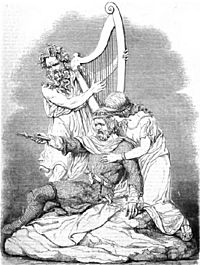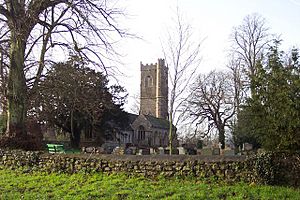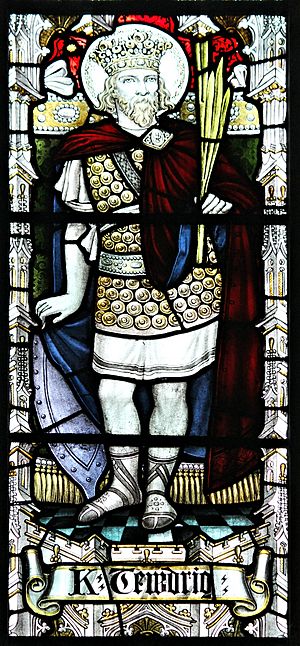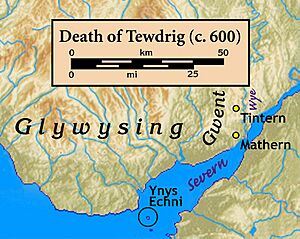Tewdrig facts for kids
Quick facts for kids Saint Tewdrig |
|
|---|---|

Death of Tewdric
after a sculpture by J. Evan Thomas |
|
| Martyr | |
| Born | fifth or sixth century |
| Died | Mathern, Wales |
| Venerated in | Roman Catholicism Eastern Orthodox Church |
| Major shrine | Church of St Tewdrig, Mathern |
| Feast | 1 April |
Tewdrig ap Teithfallt, often called simply Tewdrig, was a king in Wales a very long time ago, around the 500s or 600s. He ruled a kingdom called Glywysing.
Tewdrig decided to give up his crown to his son, Meurig ap Tewdrig, so he could live a quiet life as a hermit (someone who lives alone for religious reasons). But when his kingdom was attacked by Anglo-Saxons, he came back to lead his son's army.
He won the battle, but he was badly hurt. Because he lived a religious life and died defending his Christian kingdom against invaders, people considered him a martyr (someone who dies for their beliefs) and a saint. His special day is April 1st.
Most of what we know about Tewdrig comes from an old book called the Book of Llandaff, written in the 1100s. This book says he was king of Glywysing, but his story takes place in the area of another old kingdom called Gwent. These two kingdoms were often connected.
Contents
The Life of King Tewdrig
There are a few ideas about where Tewdrig's name came from. It might be a Welsh version of a German name, or it could be from a royal name used in other parts of Britain or France.
Tewdrig's father, Teithfallt, was also a king. During his father's time, the Saxons had caused a lot of trouble near the borders of their land, especially around the River Wye.
Tewdrig's Reign and Retirement
As king of Glywysing, Tewdrig was known for supporting the Church. He was also a successful leader in battles. At some point, he decided to step down as king. He gave his throne to his son Meurig.
Tewdrig then went to live a simple, religious life as a hermit. He chose a rocky place near the River Wye called Tintern.
The Battle and His Final Days

However, the kingdom soon faced a new threat from the Saxons. Tewdrig was asked to return and lead the defense. He agreed and led his army to victory.
Sadly, during the battle near the River Wye, he was badly wounded. He asked to be taken to an island called Ynys Echni (now known as Flat Holm) to be buried. But he didn't make it that far.
He died at a place called Mathern, near the Severn estuary. His son, King Meurig, built a church there and buried his father's body. This place became known as Merthyr Tewdrig, meaning "Tewdrig the martyr." Later, it was simply called Mathern.
It was said that Tewdrig's victory was so great that the Saxons didn't dare to invade his land again for 30 years!
A Special Story
The old stories about Tewdrig include a special detail. When he returned to fight, he was told he would win but would be mortally wounded. He was also told that two stags would pull a wagon to carry him towards Ynys Echni.
The story says that wherever the stags stopped, fresh springs of water appeared. When they reached the Severn River, the wagon broke, and a clear stream gushed out. This is where Tewdrig died peacefully.
In the 1600s, a bishop named Francis Godwin said he found a stone coffin in the church at Mathern. Inside were bones, and the skull had a bad fracture. This matches the story of Tewdrig's mortal wound. Later, in 1958, another person named Fred Hando heard a story from an old lady who claimed to have seen the coffin herself in 1881. She said she saw a hole in the skull, likely from a spear.
Main Sources of Information
The Book of Llandaff

The Book of Llandaff is a very old book written around 1125. It was created to support the claims of the bishopric (the area ruled by a bishop) at Llandaff.
Tewdrig's story in the book helps explain why his son, King Meurig, gave land near Mathern to the bishops of Llandaff. This made the Llandaff church more powerful.
 | Delilah Pierce |
 | Gordon Parks |
 | Augusta Savage |
 | Charles Ethan Porter |


